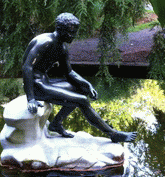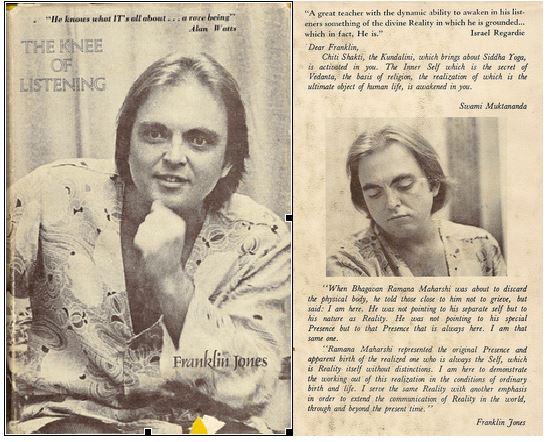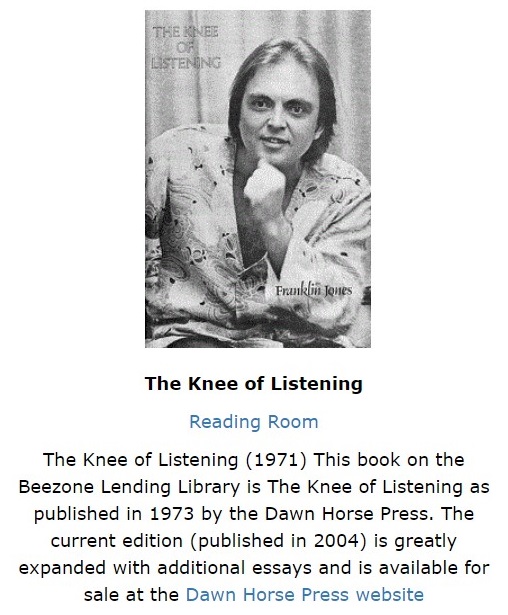
Originally published in ‘The Knee of Listening’, 1972 edition by Franklin Jones (Adi Da Samraj

The death-of Narcissus had begun in me. I was stuck with the knowledge that I was soon to go mad and die. I tried as much as possible simply to observe this process in myself. I calmly said goodbye to Nina and left for school.
When I sat down to my first morning class this process was still going on in me. There was simply this absolute fear, and all my physical and mental processes seemed to be rushing to disappear and die. As I listened to the lecture on church history I felt as if my mind were a separate, material entity. It seemed to be rushing forward at an invisible point with accelerating speed. I felt as if I were to go violently insane on the spot. I began to write very rapidly in my notebook in order simply to observe this process and not be overcome by its effects.
I wrote every word the professor spoke, and if there were a inoment of silence I would write whatever I was observing in the room or in my body. Somehow I managed to get through the fifty minute lecture. When it was over I sat by myself. My body felt in a fever and my iriind close to delirium.
The whole experience seemed to summarize all the parts of the many experiences of fear and sickness and near madness I had known in my life. It was as if every one of those experiences was an event of this same kind, which could have led to some marvelous perception if only I were able to allow the death or madness to take its course.
But in this instance, as in the past, the shock and awesome fear were too great to be allowed without resistance. I had taken a few cold pills in the previous days, and so I left school to go to a doctor for advice. The doctor said the pills were mild and not aggravating or narcotic. He attributed my heightened sensitivity and alarmed condition to perhaps overwork or some kind of nervous excitement.
None the less, I stopped taking the cold pills. I went home. All day I stretched alone on the floor of the living room, revolving in this same overwhelming fear of death. When Nina came home she tried to make me comfortable, and I passed the evening in front of the TV set observing my terror.
When Nina went to bed I also tried to sleep. But the fever of the experience only increased. Finally, I woke her in the middle of the night and asked her to take me to the hospital. My breathing had become alarming, and my heart seemed to be slowing down. At times my heart would beat irregularly and seem to stop. ‘
She drove me to a nearby emergency ward. I was examined by a nurse, and then a psychiatrist, who told me I was having an anxiety attack. There was nothing apparently wrong with me physically. He gave me a sleeping pill and told me to rest. If I felt no relief within a couple of days, I should– seek psychiatric help.
When we got home I tried to sleep, but it seemed a long time before I could sleep. During the next few days I went to a psychiatrist, and I detailed to him the entire history of my life, including my experiences with drugs and my work with Rudi. He only told me I could join a group therapy session he held every week. 1 went to his session that night, and also, the next day, to a group session for students held by a psychologist at the seminary. But there was no relief, no fundamental insight, no communication I could make that made the difference.
Finally, several days after this process began, I was lying home alone in the afternoon. It was as if all my life I had been constantly brought to this point. It seemed that all of the various methods of my life had constantly prevented this experience from going to its end. All my life I had been preventing my death.
I lay on the floor, totally disarmed, unable to make a gesture that could prevent the rising fear. And thus it grew in me, but, for the first time, I allowed it to happen. I could not prevent it. The fear and the death rose and became my overwhelming experience. And I witnessed the crisis of that fear in a moment of conscious, voluntary death. I have no idea what occurred to me physically at that time. I may very well have passed through what would appear to be clinical death. I only know that I allowed the death to happen, and I saw it happen.
When that moment of crisis had passed I felt a marvelous relief. The death had occurred but I had observed it! I remained untouched by it. The body and the mind and the per*” sonality had died, but I remained as an essential and unqualified consciousness.
When all of the fear and dying had become a matter of course, when the body, the mind and the person with which I identified myself had died and my attention was no longer fixed in those things, I perceived reality, fully and directly. There was an infinite bliss of being, an untouched, unborn sublimity, without separation, without individuation, without a thing from which to be separated. There was only reality itself, the incomparable nature and constant existence that underlies the entire adventure of life.
After a time I got up from the floor. I walked around and beamed joyfully at the room. The blissful, unthreatened current of reality continued to emanate from my heart, and • not a pulse of it was modified by my own existence or the existence of the world. I had acquired a totally new understanding. I understood Narcissus and the whole truth of suffering and search. I saw the meaning of my whole life to that moment. Suffering, seeking, self-indulgence, spirituality and all the rest were founded in the same primary motivation and error. It was the avoidance of relationship in all its forms. That was it. It was the chronic and continuous – source of our activity. It was the chronic avoidance of relationship. Thus we were forever suffering, seeking, indulging ourselves and modifying our lives for the sake of some unknown goal in eternity. !‘
Life appeared to be determined by this one process of avoidance. It was the source of separation and un-love, the source of doubt and unreality, of qualification and loss. But in fact there is only relationship, only love, only the unqualfied state of reality.
Read / Buy the Book
